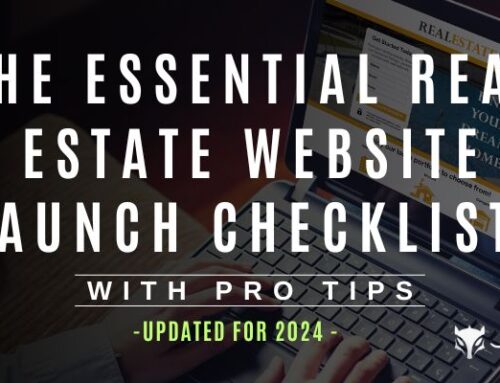As a real estate agent, your goal is to cast a wide net to reach as many prospects as possible. Agents often use lead generation websites, social media, and direct mail to accomplish this.
However, blogs are a powerful but commonly overlooked lead generator.
In this article, I’ll share the experience I’ve gained running REthority.com and give some tips and tricks to building your own blog.
The Real Estate Blog
Most real estate lead generation platforms are meant to produce instant results. These include IDX websites, pay per click campaigns, and direct mail marketing. However, savvy agents also build a blog to generate organic leads for years to come.
While building an effective blog takes time and energy, the ROI is unlimited.
An effective content marketing strategy uses high-quality content as the foundation on which the lead generation platform is built. At its core, you’re providing an answer to a search engine user’s questions.
This strategy is so powerful because you can write about anything. For example, a prospect’s web search may include things like:
- Best neighborhoods in Atlanta
- Best cities in Georgia
- Best real estate agents in San Francisco
- Cost of living Orlando
- Fun things to do in Omaha
By answering the user’s question in a clear, concise, manner, you’re likely to show up in search results. However, providing easy to read content is only part of the equation.
Search Ranking Factors
Search engines take into account many factors when determining what to display in their search results. But the most influential factors are broken down in a simple acronym: EAT.
This means Expertise, Authoritativeness, and Trustworthiness.
Expertise
Of course, as a real estate professional, you’re already an expert on your local market, and you’ve likely showcased this in your “about me” section of your website. You’ve also likely been mentioned in online reviews and on social media.
The more you’re mentioned, the more of an expert Google thinks you are. This benefits your blog postings because Google will trust your opinions when you publish information about your local market. And this helps you rank higher than others doing the same thing.
Authoritativeness
Being an expert on a topic is one thing, but being an authority is a completely separate concept. Authority is more about others trusting your opinion than anything else. To search engines, the best way to build authority is to have other websites link to yours.
For example, if Forbes links to your website, it means that a well-known, highly read publication trusts your information enough to direct its readers to your site. Websites are informally graded on their “Domain Authority,” or “DA.” Sites with a DA above 50 are often well-known and trusted. Sites with a DA above 85 are some of the most visited sites on the web.
These include Forbes, The Washington Post, CNBC, and The Wall Street Journal. Getting a link from these sites (also known as a backlink) helps signal to Google that you’re an authority in your field, but it’s not easy. But don’t worry, I’ll share my favorite ways to build links later in this article.
Trustworthiness
While you may be an expert with authority in your field, you still need to convince the search engine that you can be trusted. While this is somewhat ambiguous, think about what you do when you are considering buying a product.
Do you search for online reviews to ensure it gets good ratings and has limited feedback? If so, you are building trust in the brand. If you see good reviews, you trust it enough to buy it. Well, search engines do the exact same thing.
Social signals (online reviews, BBB complaints, brand mentions) are all factored into an algorithm to ensure the best result is put in front of the user. This is where your customer feedback and online reviews come into play. If you have a good reputation, your blog posts are likely to show up in search results.
What to Write About
Now that you understand what factors affect search engine ratings, you’ll need to start researching topics. However, you have to be strategic about your content strategy.
Researching Topics
You can make the best article in the world, but if nobody is searching for it, you’ll have wasted your time. While I use a powerful tool called ahrefs, it costs money. If you run a brokerage and plan to create a bunch of content, this is your tool.
But if you’re only planning to write a few posts, you should save your money in favor of free tools like the Google Keyword Planner. This is a free tool that shows you how many people are searching for a given topic every month. It’ll also provide the competition level for the topic. Pay close attention to this metric, because it’s harder to rank for very competitive keywords, especially if you have few backlinks or just launched your blog.
I suggest that agents pick broad topics in their local markets. Avoid topics like “how to buy a house” because they are highly competitive and are so broad that anyone in any market can write about them.
However, by picking a topic like “why Aksarben is the best neighborhood in Omaha,” you are narrowing the focus to a point where few people have likely written about it. At the same time, it’s a broad enough topic that you have a good chance of being displayed in the search results.
Writing Content
Once you know what you’ll write about, you need to write a series of posts. I use the “batching method” to content creation. This means that I’ll pick a diverse series of topics and write a few articles about each one.
I do this because I don’t know what’ll rank and what won’t. For example, if I’m writing about home warranties and DIY tips, I’ve already determined that users are searching for both. But whether my content will rank is another story.
I’m confident that I’ll provide great content, a good user experience, and my article is easy to read. However, you can never positively know that you’ll be featured in the search results. By diversifying your topics, you have the best chance of at least one of your posts showing up.
As for the content itself, you should never post an article that is not helpful to the reader. The focus should always be on quality. I’ll say that again. Your focus should always be on providing the highest-quality content possible. This means that your article should be easy to read while also answering a reader’s question.
Many Search Engine Optimization (SEO) professionals teach complicated strategies with lots of technical jargon. However, I am a big believer in the fact that, while technical SEO is important, you should not get caught up in the small details. Great content is always rewarded in the end.
Building Links
Once you have a solid content base established, you can start to build links to your site. Essentially, you’re just promoting your content and hoping for a backlink to your website in return. A backlink when another site rewards you for a good piece of content, a guest post, or a quote by providing a link to your website.
The higher the domain authority, the more powerful the link. For example, if Forbes links to your website, it can boost your overall ratings in search results. In my opinion, link building is the hardest part of building a blog. But while it’s hard work, you’ll be rewarded handsomely in the long-run. Here are my favorite ways to promote my own site:
Guest Posts
I’ve received numerous links by guest posting on other websites. In fact, the post you’re reading now is a guest post. By guest posting, you offer the host site a free piece of content that is relevant to their audience. In return, you’ll typically receive a backlink to your own site.
While this is an effective method that helps build relationships with others in your industry, make sure you’re providing high-quality content to your host site. If not, you’re wasting both of your time.
HARO
Help a Reporter Out (HARO) is a wonderful resource that matches reporters with sources (i.e. agents promoting a blog). So far, I’ve received 5 links from sites with DA ratings of 90+ by using HARO. Subscriptions start at $9 per month, and by using this service, requests for sources land in your email inbox three times per day. I’ve found that the most effective pitches take about 45 minutes to craft, and have quotes that reporters can copy and paste directly from my pitch. While this is effective, don’t be disappointed when 90% of your pitches go unanswered.
These reporters get hundreds of pitches per day, so they’ll only use the ones they see as most relevant (i.e. that provide the most value to them). When pitching a reporter, I am sure to send my reply within an hour of the request being made, and I always follow up within 12 hours of sending my initial pitch.
Next Steps
Once you have created and promoted your content, it becomes a waiting game. Most agents skip the organic blog because it’s hard work that produces delayed results. You won’t see any meaningful traffic for at least 6 months. If you’re a new site, this timeline extends to a year. However, once your content is written and promoted, it’ll show up in search results for years to come.
Conclusion
Starting a real estate blog is hard work, and it’s hard for many agents to justify the time required to launch one. Just remember — savvy agents are always thinking one step ahead. While the benefits may be delayed, they can positively impact your business for years to come.
Bio: Andrew Helling is the founder and editor of REthority.com, an online resource for real estate professionals and their clients. His experience as a real estate investor and property manager bring a unique (and sometimes humorous) insight to his writing.








Leave A Comment